Brockhaus / Antiquarium
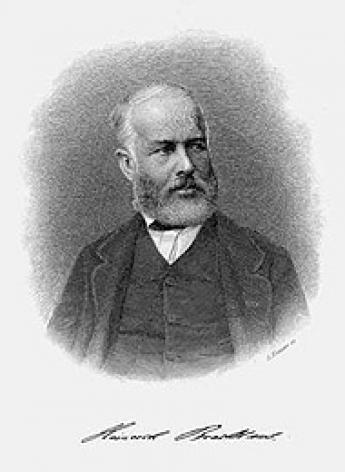
By Frank Werner
Brockhaus / Antiquarium is one of the oldest and renowned antiquarian bookshops for travel, the history of exploration and ethnology. It was founded in Leipzig, Germany, in 1856 as a department of the famous publishing house F. A. Brockhaus. The company is now based in Kornwestheim, near Stuttgart, as a part of Brockhaus / Commission GmbH, one of Germany’s largest book distributors, and still owned by the Brockhaus family. What links Brockhaus / Antiquarium and the "Brockhaus Enzyklopädie", an encyclopedia found in nearly every German home and library during the 19th and 20th century?
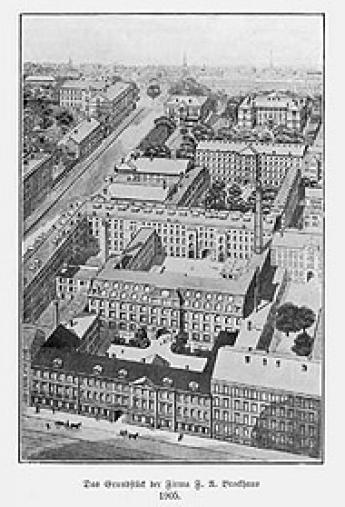
They have a common historical root. In 1805, Friedrich Arnold Brockhaus (1772-1823) founded a bookshop and publishing house in Amsterdam, which relocated to the important German publishing town of Leipzig in 1814. He bought the rights to a moribund and half-finished encyclopedia and revived it succesfully. Since then, 21 editions of this monumental work have appeared.
The firm expanded rapidly, and in 1827 a "Kommissionsbuchhandlung", an intermediate book distributor, was added. In 1837 Friedrich Arnold Brockhaus’s sons, Friedrich and Heinrich Brockhaus, bought an im- and export bookshop. For a while, there was even a branch of this shop in Paris. As the printing and selling of books turned out to be a profitable business, it was decided to expand again and to add an antiquarian book shop, too. This was common practice in the 19th century, when antiquarian bookshops often complemented “new book” shops in Germany like, for example, Harrassowitz or List & Francke.
The 1st of January 1856 is the official founding day of the “F. A. Brockhaus’ Sortiment und Antiquarium”. Collections of antique, precious, unusual and exotic objects and books were called “Antiquarium” in German from the Renaissance onward. And this is what the founders of the Brockhaus family had in mind: a treasury of rare and unusual books, manuscripts, of exotic and exceptional works of knowledge.
The mastermind behind these expansions and innovations was Heinrich Brockhaus (1804-1874). He had entered the family firm when 15, and was only 17 at his father’s death. He and his brother Friedrich, who preferred to work in the background, led the company into an era of unrivalled prominence and size. Heinrich Brockhaus was a free thinker, well-read and educated, liberal, generous and farsighted – one of the great publisher personalities of the 19th century. He got Brockhaus / Antiquarium off to a good start by engaging Paul Trömel as the first manager. Trömel (1832-1863) had begun as an apprentice in Brockhaus' distribution department and was entrusted with the new branch upon its foundation. He proved to be the very man for the job. Under his all too short leadership, the Antiquarium flourished. He published several catalogues, some of which are still works of reference, like the catalogue “Bibliotheque Américaine”, a list of 435 books of a library he had acquired in Amsterdam. He also compiled a list of Friedrich Schiller’s library which is still used as a bibliography today.
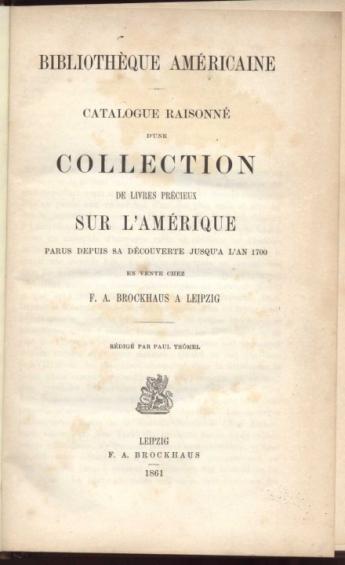
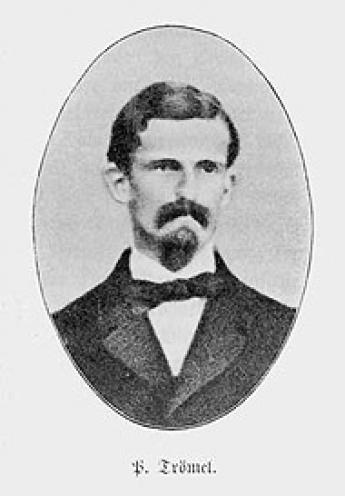
Joined to the Antiquarium was an export department for new books, which also still exists today: “Brockhaus German Books”. It did and still does business with North and South America. Emperor Dom Pedro II even made Brockhaus the Imperial Supplier of Books to the court of Brazil.
After Paul Trömel had died, Hermann Ziegenbalg managed the Antiquarium for 27 years. Many catalogues with many books on many subjects were published. They prove that Brockhaus / Antiquarium was a bookshop for scientists rather than bibliophiles. Catalogues with 4000 items were usual, and there were some that had nearly 9000 books in them. The catalogue Classische Philologie und Alterthumskunde in the year 1887, for example, had 8.972 items! The Antiquarium was staffed by a manager, 12 booksellers and 5 helpers.
Around the turn of the century, the two managing directors of the firm at that time, Albert and Rudolf Brockhaus, were discussing the future of the antiquarian department in their noble office, when a small globe fell from one of the large bookcases onto Albert’s head. This was taken as a sign and from then on Brockhaus / Antiquarium specialised in geography and travel accounts. Although this story has been handed down for generations, the reality was rather more prosaic. At that time, a trend towards selling antiquarian travel books had set in. From 1855 to 1859 Brockhaus had published the "Brockhaus’ Reise- Bibliothek für Eisenbahnen und Dampfschiffe", a cheap series of travel accounts, like paperbacks, that could be read on journeys by train or steamship. Now the publishing department began to print the originals or translations of many of the most famous travellers of the day: Stanley, Fridtjof Nansen, Sven Hedin, H.H. Johnston, to name but a few. The Antiquarium followed suit and began dealing in old and second-hand travel books.
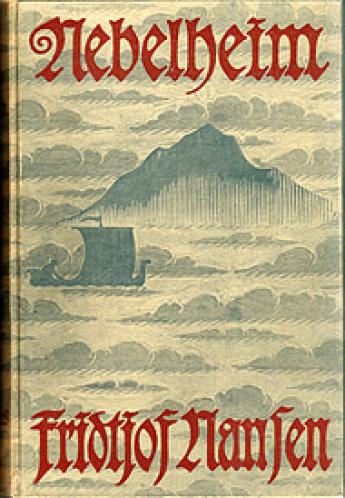

During the 1920s, the Great Recession hit all firms in Gemany equally hard. The bookshop and antiquarian department carried on in much reduced form. Then in 1933 the Nazis took over. There is no record that Brockhaus ever cooperated with the regime, even though the Nazis tried to take the whole firm over several times. On 4th December 1943 there was a huge air-raid on Leipzig, and most of the city went up in flames. The Brockhaus premises were burned to the ground. It took three weeks for the fire to die down, due to the huge rolls of printing paper in stock. That was the end of Brockhaus / Antiquarium for the time being.
Wolfgang Brockhaus, who had been responsible for the Antiquarium, the export and the book distribution department, returned from war captivity in 1947. He tried to restart that line of business, but this was nearly impossible under Soviet rule. In 1949 he relocated “his” part of the firm to Stuttgart, while the publishing department went to Mannheim. Starting anew in a half derelict building near the railway station, he began to rebuild the distribution business. When that was up and running, he turned to his main love – the old books. In 1956 the Antiquarium was re-founded, and issued its catalogue No. 1: Geographie. Many more followed: In 2010, No. 205 "Wenn einer eine Reise tut …" contained 840 books on all aspects of travel and geography.
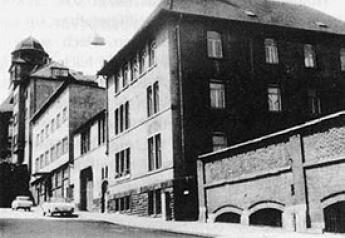
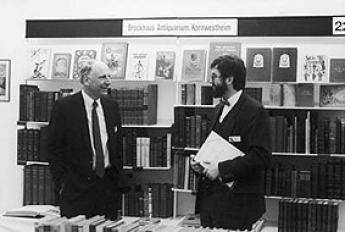
After the war, Stuttgart was a centre of the German rare and antiquarian book trade. And so it was only natural that a few Stuttgart dealers got together to found the Stuttgarter Antiquariatsmesse in 1962. The fair celebrated its 50th anniversary in January 2011, Brockhaus has a stand there from the start.
Wolfgang Brockhaus handed over his post as general manager to his son-in-law, Wolfgang Berg, in 1978. However, he still came in every day to supervise the Antiquarium. Every book that was bought had to be shown to him, and he would take his time over it. Then, when it was described, he would look at the description, correct or alter a few words or phrases in green pencil, and finally ask: “And what is the price?” If he did not like the answer, he would shake his head, mumble "hmhmhm ……". , and then he’d say: “If someone is looking for it, he’ll pay any price!” The most expensive books were kept in a huge old safe, the key to which he carried in his pocket. If a colleague bought one of these books, he would again shake his head, mumble "hmhmhm ……", and say: “It was to cheap”. On 16th December 1984 he died peacefully, having been in the office the day before.
Wolfgang Brockhaus had insisted that a copy of each Brockhaus catalogue was to go to every university library and every department of geography in the whole world, which meant that we sent out over 4000 catalogues five or six times a year. The aim was to publish one catalogue on each continent every year. However, the times were changing rapidly. Public and university libraries had less and less funds. The public’s taste was changing, too. Fewer collectors wanted the text only, regardless of the condition of the book. Fewer and fewer scientists and geographers were building or completing their own book collections. The time had come to cater to the bibliophile, the educated layman.
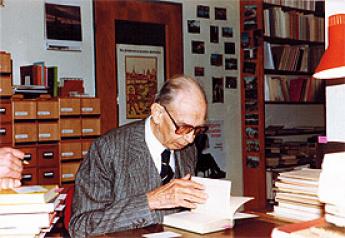
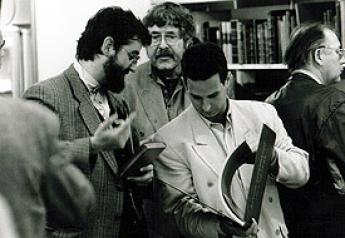
In 1982 Frank Werner joined the firm after years of apprenticeship in Bonn, London and Hamburg,, and by 1987 he became managing director of Brockhaus / Antiquarium, or "the Ant.", as it is called internally. He decided to alter the concept of the catalogues. Till then, they had been listings of the books in stock, very short, with hardly any descriptive text. Illustrations were out of question. Now he began to write longer descriptions, detailing the contents, condition and history of the books, with illustrations and distinctive covers for each catalogue. This is standard practice nowadays, but was quite innovative for the slightly old-fashioned Brockhaus / Antiquarium then.
Once in a while special catalogues like “Fahrendes Volk” (gypsies, pirates, strolling players, itinerants, vagrants of every kind), "Frauenreisen" (women travellers), "In die weite Welt hinein" (children's travel books) or “The North American Indian” were published. In cooperation with Walter Alicke of Interlibrum (Vaduz) and some other colleagues a series of three catalogues called "Fliegt mit!" on the history of flying and space travel following in the mid 1990s. Besides, Brockhaus continued to issue continental catalogues.
Well remembered is Brockhaus / Antiquarium at the International Antiquarian Book Fair in London - for one of the worst things that may happen to a rare book dealer. In 2002 all Brockhaus books got lost on its way to London. The insurance, the police, Brockhaus, all searched for the books worth many a thousands euros. In vain: Frank Werner had to "share" his empty booth with empty shelves at the Olympia Fair. The books never turned up again.
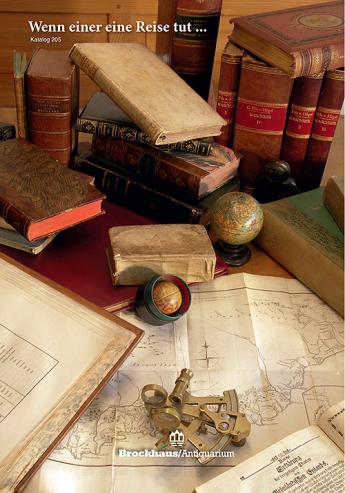
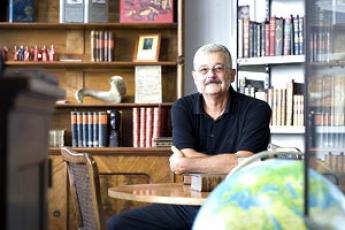
Today, the whole Brockhaus company - Brockhaus / Commission, Brockhaus / German Books, Brockhaus / Antiquarium - still belongs to the Brockhaus family. It had moved to other premises twice since 1982, and is now housed in custom-built premises in Kornwestheim, where the Antiquarium has its own stock, office, and salesroom. And so Brockhaus / Antiquarium essentially remains what it was after 155 years: a place to buy unusual, rare and beautiful books on travel, history of travel, geography and ethnology.
A German version of the article was published in "Brockhaus / Antiquarium 1856-2006", by Frank Werner and Barbara Werner van Benthem. The English translation is presented here by permission of Frank Werner. Thank you very much.
